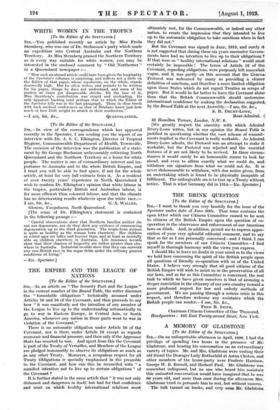THE EMPIRE AND THE LEAGUE OF NATIONS [To the Editor
of the SPECTATOR.] SIE,—In an article on "The Security Pact and the League" in the-current number of the Round Table, the writer discusses the "formidable obligations" technically assumed under Articles 10 and 16 of the Covenant, and then proceeds to say how "it was manifestly not the intention of any member of the League to live up to the understanding automatically to go to war in Eastern Europe, in Central Asia, or South America, whenever any nation in those parts went to war in violation of the Covenant."
There is no automatic obligation under Article 10 of the Coyenant, nor, is there under Article 16 except as regards economic and &andel pressure, and then Only if the Aggressor State has resorted to war. And apart from this the Covenant is Part of the Treaty of Versailles; and Members of the League are pledged honourably to observe its obligations as much as in any other Treaty. Moreover,. a scrupulous respect. for all Treaty Obligations is specially emphasised in the preamble to the COvenant, and how can this be reconciled with "a manifest' intention not to live up to certain obligations" of the Covenant ? rt is further stated in the same article that " it was-not only dishonest and dangerous in itself, but bad for that confidence and trust on which healthy international relations must
ultimately rest, for the Commonwealth, or indeed any other nation, to create the impression that they intended to live up to the automatic obligation to take sanctions when in fact they did not."
But the Covenant was signed in June, 1919, and surely it is not suggested that during these six years successive Govern- ments have had no intention to live up to their obligations ?' If that were so "healthy international relations" would most certainly be impossible ! The terms of Article 16 of the. Covenant, regarding obligations, were purposely left somewhat vague, and it was partly on this account that the Geneva) Protocol was welcomed by many as providing a clearer definition of sanctions, and therefore a more limited obligation' upon those States which do not regard Treaties as scraps of paper. But it would be far better to leave the Covenant alone+ than that the British Commonwealth should undermine international confidence by making the declaration suggestedi by the Round Table at the next Assembly.—I am, Sir, &c.,
S. R. DRURY-LOWE, Rear-Admiral.
42 Hamilton Terrace, London, N.W. 8.
[We greatly respect the sincerity with which Admiral Drury-Lowe writes, but in our opinion the Round Table is justified in questioning whether the vast scheme of commit- ments implied in the Covenant is really workable. As Admiral Drury-Lowe admits, the Protocol was an attempt to make it workable, but the Protocol was rejected and the essential: features of it are not likely to be revived. In these circum,i stances it would surely be an honourable course to look far. ahead, and even to affirm exactly what we could do, and i withdraw our signature from what we could not do. It is never dishonourable to withdraw, with due notice given, from an undertaking which is found to be physically incapable of fulfilment. The unforgivable sin is to tear up a Treaty without notice. That is what Germany did in 1914.—En. Spectator.]






































 Previous page
Previous page